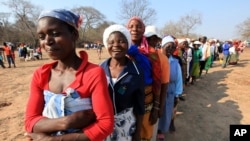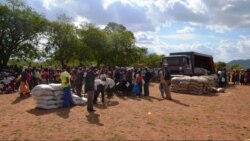The Ministry of Education recently reported that the number of school dropouts in the country is alarming as parents struggle to raise fees due to poverty.
But in remote Binga district, Matabeleland North, parents say it is not only about school fees but hunger that has forced the majority of school-going children to pull out of school.
Speaking to Studio 7 in Muchesu, which is about 80 kilometres from Binga town, parents said the current drought in the area has forced their children to stay at home.
Poverty is ravaging the district with local people looking up to the skies, hoping the heavens will open and bring them the much-needed rains.
Idah Sibanda, who has two school-going children that had to travel about seven kilometers to get to school, said she was forced to stop them from attending classes at Muchesu Primary School as they had no energy to walk to school and participate in classes.
“Here in Binga we have a big problem, that of the drought. We do not have food to feed our children and now they can no longer go to school because of the hunger. Last year we had too little rainfall and we did not harvest anything and our children do not have food,” said Sibanda.
Another villager, who only identified herself as Mrs. Mleya, said because of their desperate situation, they are now appealing to humanitarian organizations for help in order to save lives and ensure that children are able to go to school.
“There was rainfall shortage and this caused all our crops to wilt. Children are not going to school because of hunger. We are asking for help so that children will be able to go back to school and learn.”
Nyoni Membwe also told Studio 7 that besides the shortage of food, sources of water are drying up in the area with villagers being forced to share the few sources of water with their animals.
Most are traveling long distances to fetch water.
“The problem we have in Binga is that most of the areas are in region five. People are suffering from hunger. There are school dropouts now. We are really suffering. The area is so dry and now there is even a shortage of water. In some of the areas there is even a threat of closing the schools.”
According to a report published in July 2015 by the Zimbabwe Vulnerability Assessment Committee, some 1.5 million people - 16 percent of the rural population - will have insufficient means to meet their minimum food needs during the 2015-16 lean season.
It is highly unlikely that the cash-strapped Harare will be able to feed all hungry Zimbabweans as had been promised earlier in the year.
Most rural communities in the country are looking up to non-governmental organizations for food aid.






